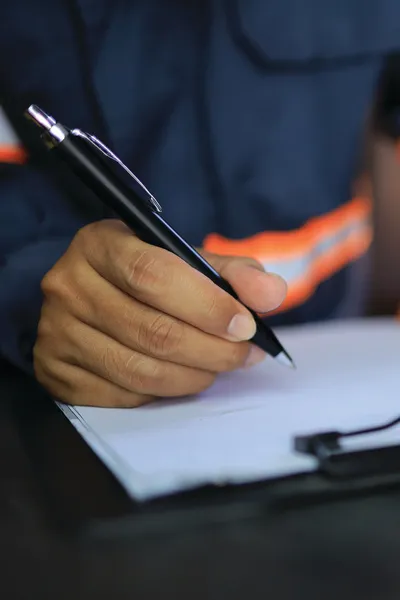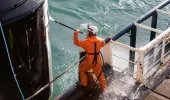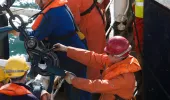As a vessel owner or operator, you want to ensure that your crew has the highest standards of medical fitness. These processes are managed by the Medical Administration Team at the Maritime and Coastguard Agency.
To ensure that every seafarer working on a UK ship is healthy and fit for work, the UK has a statutory medical examination for seafarers. The UK statutory medical certificate is the ENG 1.
In some instances (local coastal or inland waters) an ML5 certificate can be used instead of an ENG 1.
The Maritime and Coastguard Agency (MCA) also publishes guidance on:
- Medical stores
- Ship’s Doctors
- Ship Captain’s Medical Guide
- Telemedical Advice Service (TMAS)
You can find more information on the Ship Captain’s Medical Guide and the Telemedical Advice Service below along with frequently asked questions about seafarer medical fitness certificates and medical stores.
Ship Captain's Medical Guide
The MCA publishes a national guide to medical care on ships, which is called the Ship Captain’s Medical Guide (the 24th edition is the latest version).
The Ship Captain's Medical Guide is intended for use on ships not carrying a doctor. The treatment and prevention measures it recommends are confined to those that can be reasonably expected of a non-medically qualified member of the ship's crew.
Supporting guidance can be found in MIN 718 (M+F) on GOV.UK
The Ship Captain’s Medical Guide can be purchased online from TSO.
Telemedical Advice Service (TMAS)
Telemedical advice is available free of charge and provides support in cases where a seafarer is taken ill or has an accident whilst at sea.
In the UK there are two designated centres, these are:
- Queen Alexandra Hospital, Portsmouth
- Aberdeen Royal Infirmary, Aberdeen
You can find more information on how to obtain Telemedical Advice in MGN 623 (M+F) Telemedical Advice Service (TMAS) for ships at sea.
-
Medical Fitness Certificate FAQs
-
Every seafarer on a seagoing ship is required to have a certificate of medical fitness.
The requirement does not apply to anyone employed on a pleasure vessel or an offshore installation while it is on its working station.
To work on any ship operating internationally, a seafarer needs an ENG 1 or acceptable equivalent.
For small commercial vessels operating under the UK statutory Codes, and for crew members (other than the master) on some domestic passenger ships, an ML5 certificate is acceptable, but may not be internationally recognised. Guidance on who is a seafarer is given in MGN 471 (M).
Fishermen on fishing vessels also require a medical fitness certificate. An ENG 1 is required for those who are on vessels over 24 metres or at sea for more than 72 hours, or operating more than 200 miles from the coastline of the UK or beyond the Continental Shelf, or are subject to inspection in a foreign port.
An ML5 can be used by those working on vessels under 24 metres, operating within 200 miles of the UK coast and for less than 72 hours at a time.
Click here to view the current lists of MCA approved doctors.
The UK Oil and Gas medical is an industry/employer medical, not a statutory medical and so is not MLC-compliant. However, it may be suitable for someone working on an offshore vessel as an offshore worker (rather than as a member of the crew).
MGN 472 (M) gives details on substantial equivalences.
An acceptable equivalent medical certificate for an ENG 1 is a seafarer medical certificate issued by one of the national administrations listed in MSN 1815 Amendment 6 Equivalent medical certificates.
For an ENG 1, the fee is £115. This fee is set in regulations and is periodically reviewed. If additional tests are required (for example audiometry, step test) the approved doctor may charge extra for these but should agree this with the seafarer or their employer before carrying out the test. If the seafarer is employed, the employer should meet the cost of the seafarer medical examination.
ML5: There is no statutory fee for the ML5 report. Check with the Doctor before they complete the report.
This is not provided for in existing UK regulations, in STCW Manila Amendments, or MLC, 2006.
ENG 1: The approved doctor has all the documentation. It is not possible to obtain a blank certificate in advance.
ML5: Download and print the form MSF 4112 which the seafarer should take with them to the doctor who is completing it.
Hard copies can also be obtained from MCA Marine Offices or from the Royal Yachting Association (RYA).
The doctor or their receptionist should give advice on what to bring when the appointment is made. The seafarer should take any glasses/contact lenses they use (including any spares) and any current medication. If they have recently been in hospital or under a consultant, it may save time if they take with them any reports received from the doctor or a letter from their general practitioner (GP) giving the outcome of any investigation or treatment.
A seafarer attending a medical examination must produce an official document which includes a photograph for example passport, which is then checked by the approved doctor. The approved doctor must record on the seafarer's medical records the form of ID produced.
Alternatives to a passport include a photocard driving licence or discharge book.
The doctor or practice nurse will ask questions about the seafarer's medical history. The seafarer will be weighed and measured and will be required to provide a urine sample. There is also a physical examination, eye test (colour vision and distant and near vision) and a hearing test.
Usually, yes, but if the seafarer fails the colour vision test, they may be referred for a supplementary test which may be available on the same day. If the doctor has any concerns about the seafarer's fitness, they may refer them to their GP for further tests, in which case they may be unable to issue a certificate immediately. If there is expected to be any significant delay in their decision, however, they will normally issue a "temporarily unfit" certificate.
Deck department: The seafarer will be referred for a Colour Assessment and Diagnosis (CAD) test at an MCA approved CAD test centre (listed in Annex B of MSN 1886).
The CAD test centre will charge a fee for the CAD test, which is payable directly to the test centre.
Failure in this test will mean that a medical certificate may only be issued with a restriction precluding lookout duties at night. However, if the person is a Deck Cadet, they will be found permanently unfit, as they will not be able to complete the required training.
Engineering Department: The seafarer can be referred to an optometrist for a City University or Farnsworth D15 colour vision test. If the seafarer fails, the approved doctor will issue the ENG 1 certificate with the restriction "Not fit for work with colour-coded cables or equipment" and tick "not fit for lookout duties".
Other departments (catering, hotel, etc): The approved doctor will issue the certificate with "not fit for lookout duties."
Privately contracted armed security personnel: They are not considered seafarers for the purposes of the Maritime Labour Convention (MLC) but may request an ENG 1. Navigational duties do not form part of their role on board a ship, but for clarity, if they fail the Ishihara test, they should be given a restriction of "No navigational lookout duties".
Not if it is for the same restriction or reason for failure.
Permanently unfit is considered to stand for at least five years. If a seafarer wanted to undergo another medical during that time, they would need to supply clinical evidence demonstrating the reversal of the condition for which they were originally failed.
-
Medical Stores FAQs
-
The current M Notice is Merchant Shipping Notice MSN 1905 (M+F) amendment 3.
In the tables in MSN 1905 (M+F) amendment 3, the items in column 2 are mandatory. The remaining columns (specifications and quantities) are recommended.
Owners and operators may, on the advice of a qualified medical practitioner or pharmacist, determine whether any additional or different quantities, products or equipment are required, taking into account the factors identified below and any other relevant consideration the nature of the voyage and in particular:
- Ports of call, destination and duration
- Type of work to be carried out during the voyage
- Nature of the cargo
- Number of crew
For example, anti-malarial drugs may be appropriate if a ship is operating in tropical areas.
Any pharmacist should be able to deal with your request, but shipping chemists will have these stores readily available and will be familiar with the requirements and rules that apply. You can find shipping chemists by searching on the internet.
MCA will not recommend or endorse anyone in particular.



